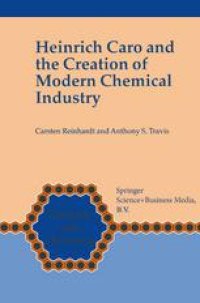
Ebook: Heinrich Caro and the Creation of Modern Chemical Industry
- Genre: History // Memoirs; Biographies
- Tags: Chemistry/Food Science general, History, Methodology and the History of Economic Thought, Commercial Law, Organic Chemistry
- Series: Chemists and Chemistry 19
- Year: 2000
- Publisher: Springer Netherlands
- Edition: 1
- Language: English
- pdf
Heinrich Caro (1834-1910) was the inventor of new chemical processes that in the two decades commencing in 1869 enabled BASF of Ludwigshafen, Germany, to take first place among manufacturers of synthetic dyestuffs. The cornerstones of Caro's success were his early training as calico (cotton) printer in Germany, and his employment at a chemical firm in Manchester, England. Caro was a creative research chemist, a highly knowledgeable patent specialist and expert witness, and a brilliant manager of science-based chemical technology. This first full-length scientific biography of Heinrich Caro delineates his role in the emergence of the industrial research laboratory, the forging of links between academic and industrial chemistry, and the development of modern patent law. Major chemical topics include the rise of classical organic chemistry, collaboration with Adolf Baeyer, artificial alizarin and indigo, aniline dyes, and other coal-tar products, particularly intermediates.
Heinrich Caro (1834-1910) was the inventor of new chemical processes that in the two decades commencing in 1869 enabled BASF of Ludwigshafen, Germany, to take first place among manufacturers of synthetic dyestuffs. The cornerstones of Caro's success were his early training as calico (cotton) printer in Germany, and his employment at a chemical firm in Manchester, England. Caro was a creative research chemist, a highly knowledgeable patent specialist and expert witness, and a brilliant manager of science-based chemical technology. This first full-length scientific biography of Heinrich Caro delineates his role in the emergence of the industrial research laboratory, the forging of links between academic and industrial chemistry, and the development of modern patent law. Major chemical topics include the rise of classical organic chemistry, collaboration with Adolf Baeyer, artificial alizarin and indigo, aniline dyes, and other coal-tar products, particularly intermediates.